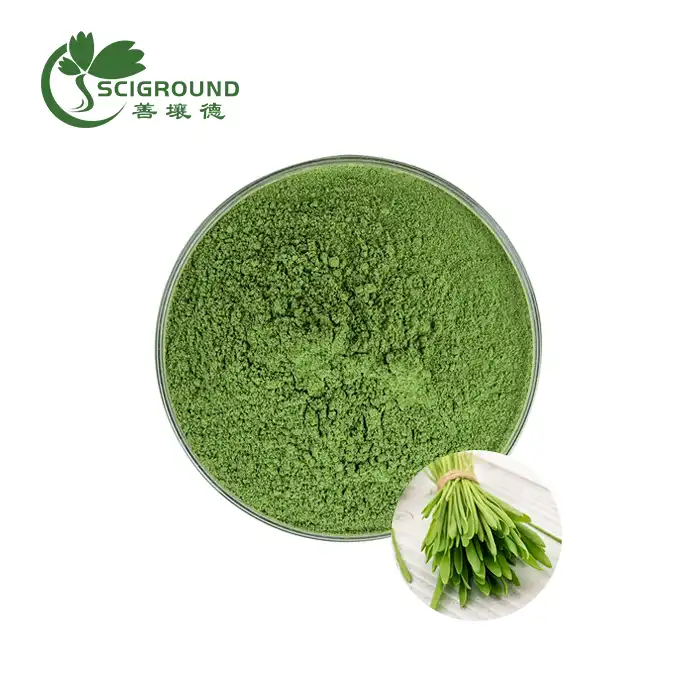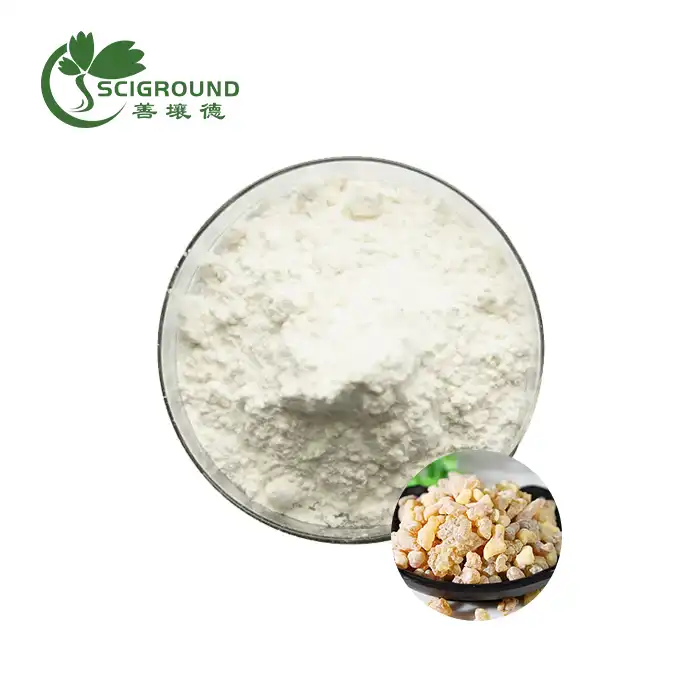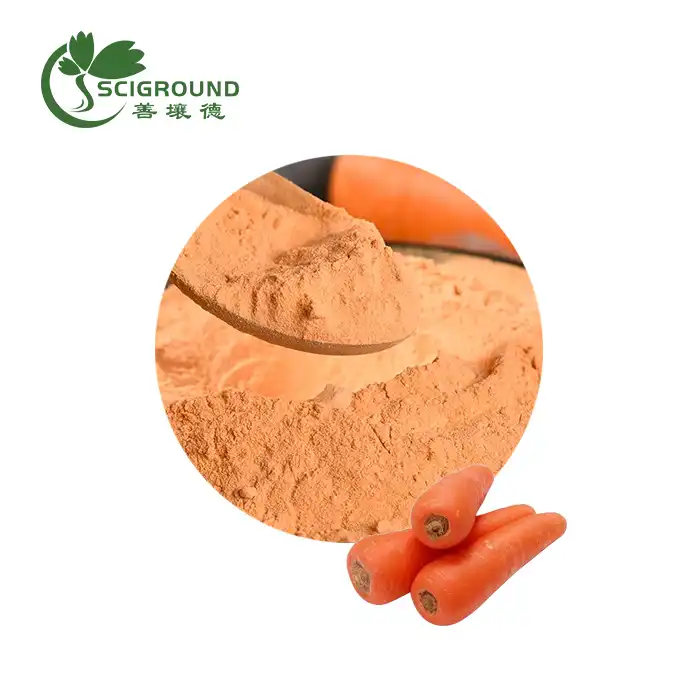What is Melatonin Powder?
Melatonin powder is a synthetic form of the hormone melatonin, which our bodies naturally produce. This hormone plays a crucial role in regulating our sleep-wake cycle, also known as the circadian rhythm. The pineal gland in our brain secretes melatonin in response to darkness, signaling to our body that it's time to wind down and prepare for sleep.
Melatonin powder is typically derived from high-quality, pharmaceutical-grade ingredients. It's available in various forms, including capsules, tablets, and liquids, but the powder form offers versatility in dosing and administration. This makes it an attractive option for those who prefer to customize their intake or have difficulty swallowing pills.
The synthesis of melatonin in our bodies is a fascinating process. It begins with the amino acid L-tryptophan, which is converted into 5-HTP (5-hydroxytryptophan). From there, 5-HTP is transformed into serotonin, a neurotransmitter that not only influences mood but also serves as a precursor to melatonin. The final step involves the conversion of serotonin into melatonin, which is then released into the bloodstream to exert its sleep-promoting effects.
Melatonin powder mimics this natural hormone, providing an external source to supplement or boost the body's own melatonin production. This can be particularly beneficial for individuals whose natural melatonin levels are low or whose circadian rhythms have been disrupted due to factors like jet lag, shift work, or aging.
Why Melatonin Powder improtant?
The importance of melatonin powder lies in its ability to address a variety of sleep-related issues that plague millions of people worldwide. In our modern society, several factors can interfere with our natural melatonin production and sleep patterns:
1. Light Exposure: Our bodies are sensitive to light, especially blue light emitted by electronic devices. Exposure to screens before bedtime can suppress melatonin production, making it harder to fall asleep. Melatonin powder can help counteract this effect, providing the sleep signal that artificial light disrupts.
2. Jet Lag: Traveling across time zones can wreak havoc on our internal clocks. Melatonin powder can help reset our circadian rhythms, allowing us to adapt more quickly to new time zones and alleviate the symptoms of jet lag.
3. Shift Work: For those who work night shifts or irregular hours, maintaining a consistent sleep schedule can be challenging. Melatonin powder can help signal to the body when it's time to sleep, even if it's during daylight hours.
4. Age-Related Sleep Changes: As we age, our bodies naturally produce less melatonin, which can lead to sleep disturbances. Supplementing with melatonin powder can help older adults improve their sleep quality and duration.
5. Stress and Anxiety: Mental health issues can significantly impact sleep. Melatonin has been shown to have calming effects, potentially helping to reduce anxiety and promote relaxation before bedtime.
The benefits of melatonin powder extend beyond simply helping people fall asleep faster. Research has shown that it can also:
- Increase total sleep time
- Improve sleep quality
- Reduce nighttime awakenings
- Enhance morning alertness
- Regulate sleep patterns in individuals with circadian rhythm disorders
Moreover, melatonin's importance isn't limited to sleep. It's a potent antioxidant that may have neuroprotective properties, potentially benefiting cognitive health. Some studies suggest it may have positive effects on immune function and cardiovascular health, although more research is needed in these areas.
For individuals struggling with insomnia or other sleep disorders, melatonin powder can be a game-changer. Unlike some sleep medications that can lead to dependence or have significant side effects, melatonin is generally considered safe for short-term use. It doesn't typically cause the grogginess or "hangover" effect associated with many sleep aids, allowing users to wake up feeling more refreshed and alert.
The versatility of melatonin powder also contributes to its importance. Users can adjust their dosage as needed, starting with a low dose and gradually increasing it under the guidance of a healthcare professional. This flexibility allows for personalized treatment plans that can be tailored to individual needs and responses.
Is it safe to take melatonin?
While melatonin powder is generally considered safe for short-term use, it's essential to approach its use with caution and awareness. As with any supplement, there are important factors to consider regarding its safety and potential side effects.
Short-Term Safety: Most research indicates that melatonin is safe when used for short periods, typically a few weeks to a few months. Many people experience no or minimal side effects. However, it's crucial to note that long-term safety data is limited, and more research is needed to fully understand the effects of prolonged use.
Potential Side Effects: While generally mild, some users may experience side effects such as:
- Daytime drowsiness
- Headaches
- Dizziness
- Nausea
- Vivid dreams or nightmares
These effects are usually temporary and subside as the body adjusts to the supplement or if the dosage is reduced.
Interactions with Medications: Melatonin can interact with various medications, including:
- Blood thinners
- Diabetes medications
- Immunosuppressants
- Birth control pills
It's crucial to consult with a healthcare provider before starting melatonin, especially if you're taking any medications or have existing health conditions.
Special Populations: Certain groups should exercise extra caution or avoid melatonin altogether:
- Pregnant and breastfeeding women: Due to limited research, it's generally advised to avoid melatonin during pregnancy and while breastfeeding.
- Children and adolescents: While some studies have shown benefits for children with certain sleep disorders, long-term effects are not well-understood. Parental guidance and medical supervision are essential.
- Older adults: Melatonin may stay active in the system longer in older individuals, potentially causing daytime drowsiness. Lower doses may be recommended.
- People with autoimmune disorders: Melatonin can stimulate the immune system, which may be problematic for those with autoimmune conditions.
Quality and Dosage Concerns: As a dietary supplement, melatonin is not strictly regulated by the FDA. This lack of oversight can lead to inconsistencies in product quality and labeling. A 2017 study found significant variations between the melatonin content listed on labels and the actual amount in the products. Some supplements even contained serotonin, which can be harmful in certain doses.
To ensure safety, it's advisable to:
- Choose reputable brands that undergo third-party testing
- Start with the lowest effective dose (typically 0.5-3 mg)
- Avoid exceeding 10 mg unless directed by a healthcare provider
- Be cautious of extended-release formulations, as they may lead to higher morning melatonin levels
Timing and Usage: Proper timing of melatonin intake is crucial for its effectiveness and to avoid disrupting your natural sleep-wake cycle. It's typically recommended to take melatonin 30 minutes to two hours before bedtime. Taking it too early or too late can shift your sleep cycle in unintended ways.
Dependency and Tolerance: Unlike some sleep medications, melatonin is not known to cause physical dependence. However, psychological dependence can occur if users rely too heavily on the supplement for sleep. It's important to address underlying causes of sleep issues and use melatonin as part of a comprehensive sleep hygiene plan.
In conclusion, while melatonin powder can be a helpful tool for managing sleep issues, it's not a magic solution. Its safety profile is generally favorable, but individual responses can vary. As with any supplement or medication, it's crucial to approach melatonin use thoughtfully, under the guidance of a healthcare professional, and as part of a holistic approach to sleep health.
Remember, good sleep hygiene practices such as maintaining a consistent sleep schedule, creating a relaxing bedtime routine, and optimizing your sleep environment are fundamental to achieving restful sleep. Melatonin powder can be a valuable complement to these practices, but it shouldn't replace them.
References:
- Auld, F., Maschauer, E. L., Morrison, I., Skene, D. J., & Riha, R. L. (2017). Evidence for the efficacy of melatonin in the treatment of primary adult sleep disorders. Sleep Medicine Reviews, 34, 10-22.
- Costello, R. B., Lentino, C. V., Boyd, C. C., O'Connell, M. L., Crawford, C. C., Sprengel, M. L., & Deuster, P. A. (2014). The effectiveness of melatonin for promoting healthy sleep: a rapid evidence assessment of the literature. Nutrition Journal, 13(1), 106.
- Ferracioli-Oda, E., Qawasmi, A., & Bloch, M. H. (2013). Meta-analysis: melatonin for the treatment of primary sleep disorders. PloS one, 8(5), e63773.
- Savage, R. A., Zafar, N., Yohannan, S., & Miller, J. M. (2021). Melatonin. In StatPearls [Internet]. StatPearls Publishing.
- Sletten, T. L., Magee, M., Murray, J. M., Gordon, C. J., Lovato, N., Kennaway, D. J., ... & Rajaratnam, S. M. (2018). Efficacy of melatonin with behavioural sleep-wake scheduling for delayed sleep-wake phase disorder: A double-blind, randomised clinical trial. PLoS medicine, 15(6), e1002587.
- Zhdanova, I. V., Wurtman, R. J., Regan, M. M., Taylor, J. A., Shi, J. P., & Leclair, O. U. (2001). Melatonin treatment for age-related insomnia. The Journal of Clinical Endocrinology & Metabolism, 86(10), 4727-4730.
Are you interested in learning more about our high-quality Melatonin Powder? We'd love to hear from you! Contact us at info@scigroundbio.com for more information on how our product can help improve your sleep quality and overall well-being.







